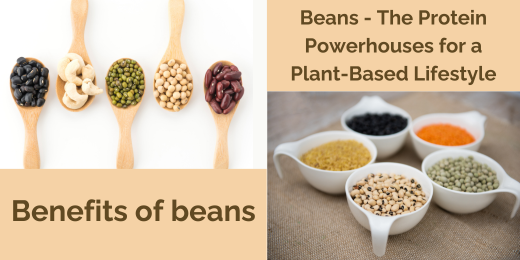
Beans – The Protein Powerhouses for a Plant-Based Lifestyle
Beans play a crucial role in a plant-based lifestyle, offering numerous benefits as an alternative protein source. With the rising popularity of plant-based diets, beans have become a sought-after ingredient. They provide essential nutrients, including protein, fibre, vitamins, and minerals, making them a valuable addition to any diet. The high protein content in beans supports muscle growth and repair, making them particularly beneficial for athletes and fitness enthusiasts.
Moreover, the fibre in beans aids digestion and promotes satiety, assisting with weight management. As plant-based diets gain traction, incorporating beans into daily meals is a smart choice for a sustainable and nutritious lifestyle. Harnessing the benefits of beans and embracing the importance of fruits and vegetables allows individuals to meet their protein needs while benefiting from a nutrient-packed diet that promotes overall health
The Nutritional Benefits of Beans
Beans are a powerhouse of nutrition, making them an excellent addition to a plant-based lifestyle. Firstly, beans are known for their high protein content, which plays a vital role in muscle growth and repair. Whether you follow a vegetarian or vegan diet or simply want to reduce your reliance on animal-based protein sources, beans provide a valuable alternative. Additionally, beans are an excellent source of dietary fibre, which is essential for a healthy digestive system.
The fibre in beans aids in digestion, prevents constipation, and promotes a feeling of fullness, supporting weight management goals. Furthermore, beans are packed with a variety of vitamins and minerals that contribute to overall health and wellbeing. From iron and magnesium to folate and potassium, beans offer a range of nutrients that support various bodily functions. Embracing the benefits of beans can significantly enhance your plant-based diet and promote a healthier lifestyle.
Types of Beans and Their Unique Qualities
Beans are a diverse and versatile group of legumes, offering a wide range of options for those embracing a plant-based lifestyle. Common types of beans include black beans, chickpeas, kidney beans, and lentils. Each variety possesses a unique nutritional profile and flavour, adding depth and variety to meals. For instance, black beans are rich in antioxidants and fibre, while chickpeas provide a good amount of protein and iron.
Kidney beans offer a good source of folate and potassium, while lentils are packed with protein and essential minerals. Beyond their nutritional benefits, beans can be incorporated into various cuisines and recipes. Whether in stews, salads, curries, or burgers, beans lend themselves well to a wide array of dishes, making them a versatile ingredient for creative and flavourful plant-based cooking. Moreover, organic food products have the potential to enhance the human immune system significantly.
Incorporating Beans into a Plant-Based Diet
Beans are a versatile and budget-friendly ingredient with numerous health benefits. Here are practical tips to incorporate beans into daily meals and snacks. For breakfast, add mashed beans to scrambled eggs or spread bean-based hummus on toast. Toss cooked beans into salads or soups for lunch. Replace meat with beans in dishes like chili for dinner. Snack on roasted chickpeas or bean-based energy balls.
Try delicious bean-based recipes for breakfast, such as black bean and avocado omelette, or kidney bean frittata. For lunch, enjoy black bean and corn salad or white bean and tuna wrap. Dinner options include cannellini bean stew or chickpea curry. Proper cooking methods, like soaking and thorough cooking, maximize the benefits of beans. Additionally, it’s essential to remember that a balanced diet, regular physical activity, and adequate sleep are the fundamental components of a healthy lifestyle that contributes to overall well-being.
The Environmental Impact of Beans
Beans offer a sustainable alternative to animal-based protein sources, making them an environmentally friendly choice. Compared to livestock farming, bean cultivation has a significantly lower impact on the planet. Beans require fewer resources, such as land and water, to grow, resulting in reduced greenhouse gas emissions and water usage. The benefits of beans extend beyond personal health, as their production contributes to a healthier planet.
By opting for beans as a primary protein source, individuals can make a positive environmental impact. Not only are beans nutritious and versatile, but they also play a crucial role in mitigating climate change and preserving precious natural resources. So, let us embrace the benefits of beans and contribute to a more sustainable and eco-conscious future.
Conclusion
Beans are a powerhouse of nutrition and a versatile ingredient for those following a plant-based lifestyle. Packed with protein, fibre, vitamins, and minerals, beans provide a well-rounded source of nutrients. Beyond their nutritional value, beans also have a positive impact on both personal health and the environment. Incorporating beans into our diets can help lower cholesterol, regulate blood sugar levels, and promote digestive health.
Additionally, beans have a lower carbon footprint compared to animal-based protein sources, making them an eco-friendly choice. By choosing beans, we can nourish our bodies while also reducing our environmental impact. So, let us embrace the benefits of beans and explore the countless delicious ways to incorporate them into our meals, contributing to a sustainable and nutritious choice for ourselves and the planet.